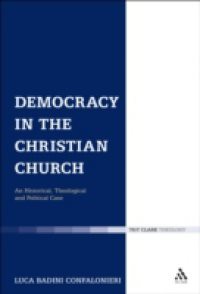Are church structures divinely-willed, and consequently both permanent and irreversible? Can Christians modify the polity of their church like they do with that of civil society? What would be the role of the office of oversight in a Christian church democratically organized? What would its relationship with specialized authorities within the community be? Building on a remarkable number of specialist studies in exegesis, church history, political philosophy, canon law, and ecclesiology, this book convincingly fulfils three goals. First, it encourages Christians to determine the political outlook of their faith community. Secondly, it provides some fundamental criteria for judging the ethical value of church structures, on the basis of Bernard Lonergan's cognitional theory and with the help of recent insights from contemporary political philosophy. Thirdly, it outlines a largely novel and groundbreaking understanding of a democratic church. In the process, it engages with some of the most difficult ecclesiological issues faced by most Christian churches.

